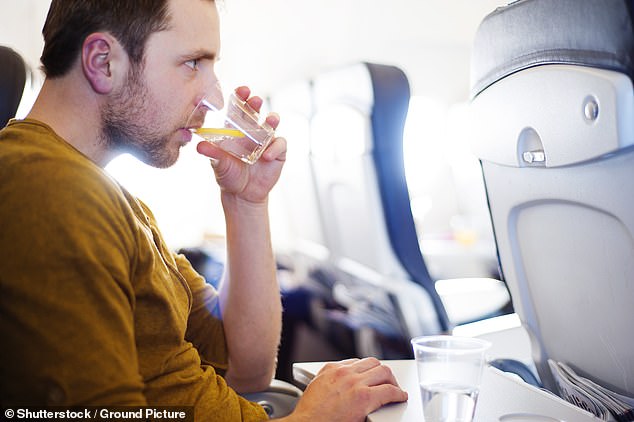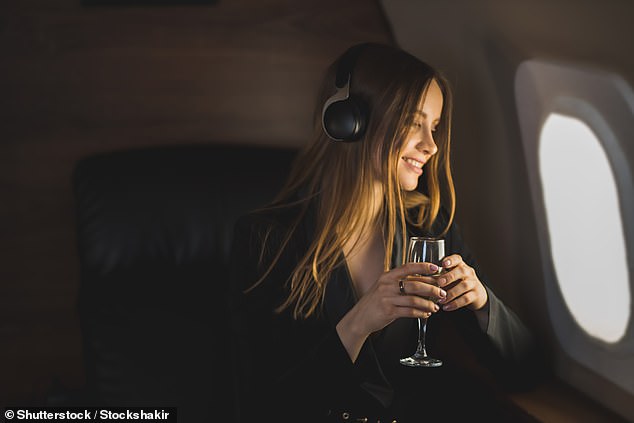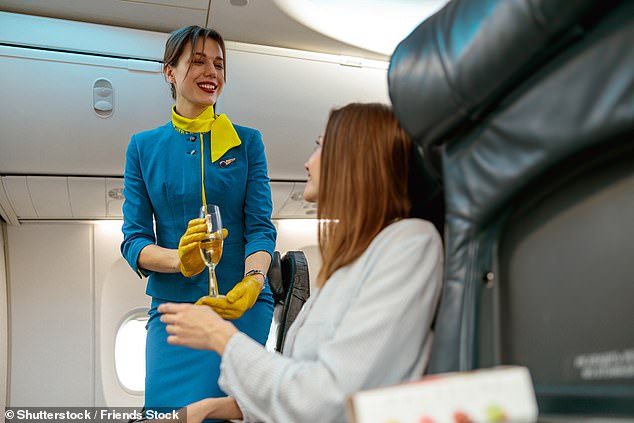- Research shows alcohol reduces oxygen and increases heart rate of travelers who fly
- The effect increases as more alcohol is consumed, especially for older passengers
- Cardiac changes observed in young, healthy passengers sleeping on a flight
There’s nothing like that first glass of wine or pint of beer to get you in the mood for a vacation at the airport.
However, it’s not all good news, as consuming alcohol before falling asleep on a plane puts so much pressure on the heart that it could be fatal.
Researchers found that this combination reduces the amount of oxygen in travelers’ blood and increases heart rate, even in those who are young and healthy.
The greater the amount of alcohol drunk, the greater these effects could be, especially among older passengers and those with medical conditions, they warned.
Academics suggested it may be time to consider limiting access to alcohol on board, particularly on long-haul flights.
Researchers found that alcohol consumed by sleeping airplane passengers reduces the amount of oxygen in the blood and increases heart rate, even in those who are young and healthy.

The greater the amount consumed, the greater these effects could be, especially among older passengers and those with medical conditions.
Dr Eva-Maria Elmenhorst, from the German Aerospace Center in Cologne, said: “The situation could be different for passengers with pre-existing medical conditions.
“Your oxygen saturation could be low at first and then drop to even lower levels. Therefore, medical conditions could worsen and cause medical emergencies during the flight.
“I would advise people with heart or lung conditions to avoid drinking alcohol on airplanes.”
For their study, they recruited 48 people between 18 and 40 years old. Half slept in a laboratory with normal air pressure and the others in an altitude chamber that mimicked the cabin pressure of an airplane at cruising altitude.
The groups then slept for four hours, half of each without having drunk alcohol while the others drank the equivalent of two cans of beer or two glasses of wine.
Those who slept under normal conditions without alcohol had stable blood oxygen levels at around a healthy 96 percent with a sleep heart rate of 64 beats per minute (bpm).
But those who drank and were in the altitude chamber had their blood oxygen levels drop to an average of 85 percent and their heart rate generally increased to nearly 88 bmp during sleep.
This compares with an average blood oxygen level of 88 percent and a sleep heart rate of 73 bpm for those in the altitude chamber who did not consume alcohol.
Participants slept lying down, so findings may differ for those flying economy class, according to a report published in the journal Thorax by a team at the Institute of Aerospace Medicine in Cologne, Germany.

Academics have suggested that it may be time to consider limiting access to alcohol on board, particularly on long-haul flights.
They concluded: “Taken together, these results indicate that, even in young, healthy individuals, the combination of alcohol intake with sleep under hypobaric conditions (cabin pressure) places considerable stress on the cardiac system and could lead to exacerbation of symptoms in patients with heart disease or lung disease.’
These effects could be even greater in older people, they suggest, adding: “Cardiovascular symptoms are prevalent in 7 percent of medical emergencies on board, and cardiac arrest causes 58 percent of aircraft diversions.”


